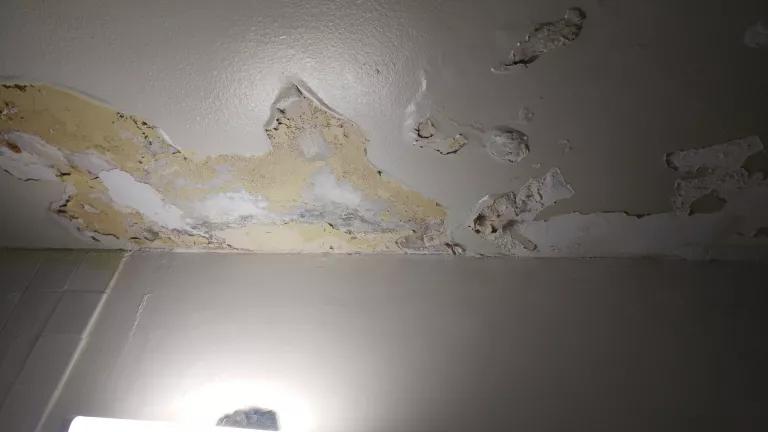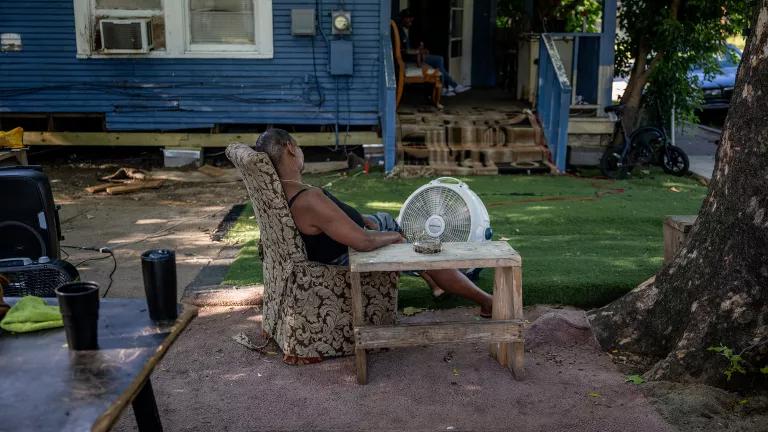Groups Take NYCHA Back to Court Over Rampant Mold Problem

Ms. Awilda Garcia has been fighting NYCHA to fix the mold problem in her bathroom of the East Village’s Wald Houses for 11 years. She suffers from asthma, and her illness is exacerbated by it. She has consistently put in work order requests, and NYCHA has made 10 maintenance visits to her apartment so far. But instead of fixing the underlying moisture problem fueling the mold, each time they’ve taken superficial steps to merely mask it—cleaning the ceiling and painting over it. And, inevitably, it returns in short order.
By law, this is no longer supposed to happen. In December 2013, NRDC and the National Center for Law and Economic Justice—which had filed a class action lawsuit on behalf of affected tenants and community partners South Bronx Churches and Manhattan Together—reached a court-ordered settlement with NYCHA that required the public housing authority end its practice of using cosmetic fixes to address the problem, and instead truly repair mold and moisture problems quickly, within seven days for simple repairs and fifteen days for more complex issues. In 2015, with pro bono support from the law firm Hogan Lovells, we went back to federal court to enforce our agreement after NYCHA had failed to meet its terms. The judge ruled that the agency had “been out of compliance…from the day” the settlement was ordered and took the extraordinary step of appointing an independent authority—called a Special Master—to oversee the agency’s compliance moving forward.
Yet, while NYCHA claims it has improved their process since then, community organizers and tenants like Ms. Garcia report that—for them—little has changed. “We have been completely disappointed by NYCHA’s performance over the past four years. Most residents have seen no improvement in how NYCHA deals with mold and excess moisture,” said Maria Nieves, a leader with St. Cecilia’s Holy Agony Church and the Metro Industrial Areas Foundation.
So today, on behalf of our clients and NYCHA tenants citywide, NRDC, NCLEJ, Quinn Emmanuel, and other pro bono attorneys are taking another step to hold the agency accountable by asking the U.S. district court to approve an amended settlement agreement, which was approved by all parties, and includes the following major improvements:
- Appoints an independent mold analyst who will perform quarterly inspections of randomly selected apartments to ensure NYCHA has effectively made required repairs.
- Appoints an ombudsperson who will be available to address individual tenants’ concerns about repairs, and whether those are happening effectively and on time. If not, the ombudsperson will have authority to provide relief for tenants, including ordering an independent contractor hired through the Special Master to complete the repairs at NYCHA’s expense.
- Protects tenants from capital improvement delays by recognizing that families living in uninhabitable conditions can’t be expected to wait months for a major upgrade—such as replacing a building’s entire roof—and therefore need to be given priority for apartment transfers.
- Improves time requirements for flooding repairs. The agency will have to ensure flooding situations are fixed in 24 hours and apartments are dried out within 48 hours.
- Sets better protocols for how to fix mold. The agency will be required to use moisture meters, fungicidal paint, mold-resistant construction materials, and ensure pipes are properly insulated when making repairs. NYCHA also must run all building roof fans for 24 hours a day where possible.
- Sets measures to ensure honest reporting. In light of recent revelations about NYCHA filing false paperwork related to lead paint inspections, all required reports about mold remediation and requests for reasonable accommodation for residents with asthma—a right guaranteed by the Americans with Disabilities Act—must be certified by a NYCHA manager under penalty of perjury. There will also be an Independent Data Analyst appointed to oversee the accuracy of NYCHA’s reporting.
Additionally, we expect the judge will hold a public hearing to give impacted residents an opportunity to make sure their voice is heard, ensuring their problems and NYCHA’s history of noncompliance are entered into the public record.

“NYCHA tenants have waited four long years for effective mold remediation. We look forward to working with the Ombudsperson and other independent experts to ensure NYCHA makes real progress immediately,” said Reverend Getulio Cruz Jr., Pastor of Monte Sion Church and a leader in the Metro Industrial Areas Foundation.
For too long, NYCHA tenants have suffered under the agency’s culture of mismanagement and neglect—paying the price in their health and quality of life. This agency is larded with bureaucracy and we’re hopeful today’s settlement will help cut through it, to bring long-awaited and much-need relief for tenants. These changes will give some more teeth to the court-ordered improvements, to help ensure the agency is finally starting to do what it’s supposed to do to address the rampant mold problem once and for all.




